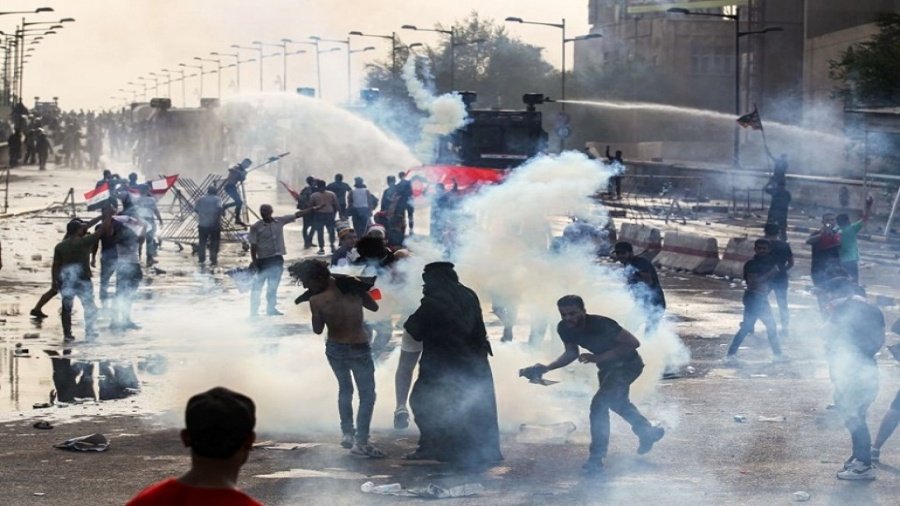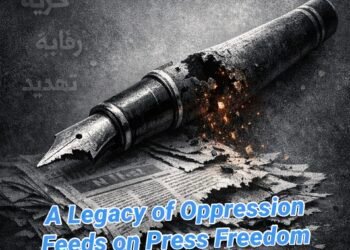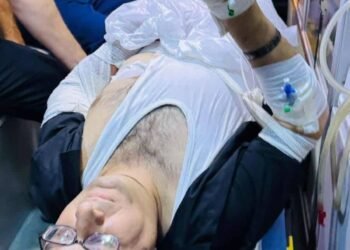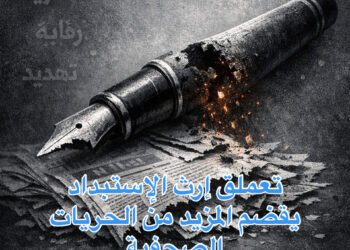Armed Attacks, Raids, 17 media bodies shut down and hostilities offending more than 88 Journalists
October marked the worst month of press freedom in Iraq since 2003.
During the October demonstrations, Iraq witnessed unprecedented violations of journalists in a range of Iraqi provinces, where the association recorded through its observers in a group of provinces: (89) cases of violation against journalists, and as follows:
Armed attacks, raids and closures of media headquarters and offices: 17 media bodies
Threats of liquidation: 33 journalists
Arrests without arrest warrants: 8 journalists
Live fire and tear gas canisters: 14 journalists
Beating and preventing from coverage: 28 journalists
Armed attacks and abuses against media channels and institutions
Since the beginning of the demonstrations, the association has recorded 17 cases of violation of media channels and institutions:
1. On October 4th, 2019, the headquarters of Al-Ahwar Channel in Nasiriyah province was burned by a group of protesters.
2- On October 5th, 2019, the headquarters of the Dijla channel in Baghdad was raided by an armed party, and set fire to parts of it, after beating workers and confiscating their mobile phones. Dijla remained closed until it resumed broadcasting from Amman, Jordan, nearly two weeks after the incident.
3- On the same day, minutes after the storming of the Headquarters of Dijla, the same gunmen who were roaming in shaded 4 wheel drive cars with no plates, computers and the broadcast center, which led to the suspension of the satellite signal completely, and then attacked the workers by Beating and cursing them before finally warning them not to resume function. The satellite did not return to regular broadcast till reporting time.
4- On the same day, the same armed force attacked a media company that includes the offices of (Alarabiya, Al-Arabiya Alhadath, Alghad, and Turkish TRT) satellite channels. Under the attack, an employee was seriously injured (according to Al-Arabiya Alhadath) and then destroyed Alarabiya and Al-Arabiya Alhadath Equipment.
5- Hours after these incidents, gunmen stormed the building of Al-Nahrin terrestrial channel, expelled its workers, took control of the entire building, and turned off the channel’s broadcast until October 21st.
6- On October 6th, the headquarters of AlFurat Channel was attacked by a “suicide bomber” drone, which targeted one of the buildings, injuring one of its employees, and causing serious material and financial damage.
7- On the same day, al-Rasheed satellite channel dropped its signal by order of its Director, without further explanation, but the staff confirmed that the owner of the channel was under anonymous political pressure. Al-Rasheed resumed broadcasting before the eruption of October 25th demonstrations.
After the demonstrations broke up again on October 25th, 2019, another group of channels were burned by unknown assailants:
8- An unknown group burned down the headquarters of Alfurat Radio in Diwaniyah province.
9- Followed by the burning of the office of AlEmel Radio in Diwaniyah province
10- Unknown assailants also burned down the office of Al-Amr radio in Maysan province.
11- The headquarters of Zahratul Furat radio was burned by unknown assailants in Diwaniyah province.
12- The Director of DIjla channel came under considerable political pressure to drop the channel’s signal, following his coverage of the 25th demonstrations.
13- Nasiriyah terrestrial channel stopped broadcasting demonstrations after local government’s pressure.
14- On Oct. 26th, and outside the context of the demonstrations in Baghdad and the southern provinces, Kurdistan region forces stormed the building of (NRT Kurdish) channel for political reasons, and it is reported that the satellite channel covered the demonstrations in many cities of Iraq.
15. Media and Communications Commission suspended the broadcast of the Alarabiya and Alarabiya Alhadeth channels in Baghdad claiming their violating the rules and regulations of broadcasting.
16. On the same day, a group of civilians broke into Al-Diyar TV building in Baghdad and broke some equipment, for unknown reasons.
17. On Oct. 27th, national security agents stormed the headquarters of Aljeil Aljadid Radio in Karbala under the pretext that they did not have a broadcasting license.
Victims of live rounds and Gas canisters
The Press Freedom Advocacy Association in Iraq recorded 14 injuries as a result of covering October protests:
Threats
The association recorded 33 cases of death threats and physical liquidation by political, armed and security forces in Basra, Diwaniyah, Dhi Qar, Karbala, Baghdad and Babylon.
The press circles were concerned about the threats made by security agencies to arrest several so-called instigators of violence, particularly as Baghdad witnessed the arrest of a number of activists following the events in early October, which led to changing the residencies of many journalists.
Arrests with no warrants
– Oct. 2nd, federal police forces arrested al-Rasheed TV staff and took them to their headquarters at Abi Nawas Street, where they were beaten and the correspondent Ahmed Al-Rikabi sustained a ruptured right knee and bruises on his thighs.
– Oct. 27th, security forces arrested the staff of al-Rasheed satellite channel; correspondent Arshad Alhakim and cameraman, Ali Fadhil.
– On the same day, a masked armed group arrested al-Mada TV reporter Hussein Al-Amil, from his home in Dhi Qar province, along with several members of his family, during a wave of arrests of a number of civilian activists.
– On the same day, national security agents in Karbala province arrested a number of radio workers from Aljil Aljadid radio, including colleagues Saad al-Ramahi and Rami al-Karbouli, without warrants who remain arrested till reporting time.
– Oct. 28th, according to orders of commander of operations in Karbala, riot police arrested (Haidar Hadi, iNews correspondent, Tarek Al-Tafi, correspondent of al-Alrassid TV, Mohammed al-Assadi, correspondent of Al-itijah TV) for several hours and released them only after the intervention of the journalists’ Syndicate in the province.
Beating, banning and obstructing coverage
The association recorded (6) types of attacks of beating and preventing and obstructing the coverage of 17 journalists in various Iraqi provinces during the October demonstrations:
– In the first and second days of the demonstrations, a group of journalists were beaten and prevented from coverage and their equipment was confiscated. SWAT forces in Diwaniyah beated a group of media professionals and prevented them from covering, namely (Zaid al-Fatlawi, Hassanein al-Mayahi, Mohammed Hassan, Mohammed al-Bolani, Dhiaa Almuhja, Mustafa al-Mayahi, Nabil al-Jubouri, Mayada Ibrahim).Riot police attacked AP reporter Haidar al-Jurani and prevented him from coverage in Basra province.
– On the second day of the demonstrations (2/10/2019), colleagues Ahmed Zaidi and Abbas Radhi, a reporter and photographer of Alfurat TV channel, were beaten and prevented from covering Altayaran Square demonstrations in Baghdad by security forces
– presenter of the program Raise Your Voice, Ayman al-Ameri was beaten by security forces and prevented from coverage where his equipment was confiscated and all recorded material deleted before returning his equipment.
– When demonstrations resumed in a number of Iraqi cities on the 25th, riot police beat Altaghyir correspondent Mohammed Qadir while covering demonstrations in Tahrir Square, after which he was taken to hospital.
– Federal police beat fellow INews cameraman Bilal Ayman and France-Presse cameraman Salman Al-Yassiri while covering demonstrations in Karbala province.
– Oct.27th, cadres of Al-Iraqiya TV in Baghdad, consisting of (correspondent Thamer al-Shammari and photographer Ihsan Ibrahim) were beaten by demonstrators in Baghdad’s Tahrir Square. IN Basra, the demonstrators ousted the cadres of two channels: AlIraqiya (correspondent and cameraman) and Afaq (correspondent and cameraman).
– Oct. 28th, the cadres of Al-Iraqiya TV in Baghdad (correspondent and cameraman) and Diwaniyah (correspondent and cameraman) were expelled, and the staff of Afaq TV (two correspondents and cameramen) were also expelled in Dhi Qar and Diwaniyah.
The association was not able to talk to the correspondents and cameramen who were pushed out of the demonstrations, but the administrations of both Aliraqiya and Afaq announced that they could not send their cadres again to the demonstration slot as a result of the anger and annoyance of the demonstrators from their speech, demanding that the names of the victims remain anonymous.
Conclusion:
At the time that the Press Freedom Advocacy Association in Iraq thanks all its coordinators and representatives in the Iraqi provinces and the press family throughout Iraq for their contribution to this statistic, it values this solidarity and team spirit among Iraqi journalists that is witnessed in Iraq for the first time, according to the data available to the association.
The association affirms that this setback recorded by Iraq after 16 years of experience of democratic rule, is a bad indicator of dealing with the articles guaranteed by the Constitution, including freedom of journalistic work, as well as arrests without warrants, threats, coercions and intrusions into different media bodies, witnessed by all including the international organizations functioning in Iraq, without moving a scratch in true support.
The association condemns the lack of protection of the media from its different headquarters to its network of correspondents, and affirms that these flagrant violations of the freedom of journalism have not been witnessed before in Iraq, even in the days of administrative chaos in the years 2003-2005, nor during the years of sectarian violence 2006-2007.
The association also expressed surprise at the attitude of international organizations in Iraq, particularly the UN mission, which had little role in pressuring the Iraqi government to stop the attacks, which had been recorded for the past month of October, amid terrible silence.
The association’s demand, which it will not give up, is to uncover the perpetrators who broke into the media headquarters in Baghdad, who were concealed by the government’s report, and who broke into many television stations and set them on fire for several days.
It also demands that anyone who deliberately fired tear gas at cameras and live broadcasts be held accountable not leaving behind those who have ordered the arrest of journalists without judicial orders.




